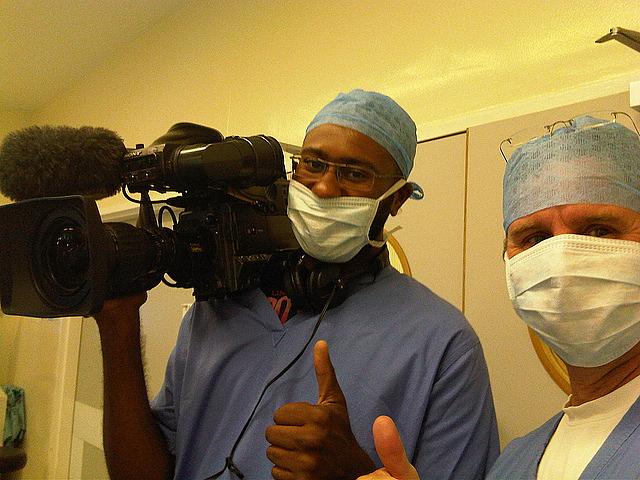Questions arise over hospital 'reality' TV shows

(Photo courtesy of Andy G/Flickr)
On January 2, ProPublica and The New York Times co-published “When a Patient’s Death is Broadcast Without Permission,” a powerful article that explored legal and ethical questions posed by ABC’s “NY Med” and similar TV documentaries about actual medical dramas taking place in hospitals.
The article focuses on an episode in which doctors tried unsuccessfully to save Mark Chanko, who had been hit by a sanitation truck while crossing the street near his home in Manhattan. Neither Chanko nor his family gave consent for the TV crew to film or broadcast his treatment at New York-Presbyterian Hospital. The family first learned about the filming when Mark’s wife happened to watch the episode.
She tells ProPublica:
". . . even with the blurred picture, you could tell it was him. You could hear his speech pattern. I hear my husband say, ‘Does my wife know I’m here?’. . . .I hear them saying his blood pressure is falling. I hear them getting out the paddles and then I hear them saying, ‘OK, are you ready to pronounce him?’ . . . I saw my husband die before my eyes.”
“Such moments — indeed, all of the intimate details of a person's health — are supposed to be shared only with a patient and whoever they designate, under a federal law known as Hipaa [Health Insurance Portability and Accountability Act],” writes Charles Ornstein, the reporter.
Did “NY Med” or New York- Presbyterian break the federal health privacy law? Did they violate state or institutional patient privacy policies? These legal questions are in dispute. The Department of Health and Human Services is considering whether New York-Presbyterian violated Hipaa by disclosing Chanko’s personal health information to the TV film crew. His family lost a lawsuit for damages against the hospital and the TV show, but it has asked for a review.
Even if the TV show’s actions were legal, were they ethical?
The answers are important for health journalists and, in particular, for TV journalists who work, or aspire to work, on hospital documentaries. They are also important for hospital leaders who either have contracts with shows like “NY Med” or are considering them.
Jeffrey Flyer, dean of Harvard Medical School, told the Boston Globe last week that after reading the ProPublica/New York Times article he became concerned about privacy and ethical questions at Harvard-affiliated hospitals where ABC is filming a similar series. But he said that after speaking with the president of Partners HealthCare, the system that includes those hospitals, “he was reassured, and has ‘every expectation,’ that the hospitals have strong privacy and ethics policies in place to protect patients. This [filming] could be done in a way that is entirely beneficial to health education and not violate anybody’s rights.”
Bioethicists aren’t so sure. Among the questions parsed over several days on a bioethics listserv: Was it only wrong not to seek out the man’s wife for consent to film and broadcast his treatment, or was it wrong to have the cameras rolling at all? Did the show violate medical ethics and journalism ethics?
This discussion thread prompted the Journal of Clinical Ethics to post the full text of an article written in 2013 by Terence Wrong and Erica Baumgart, two producers of “NY Med” and “Boston Med”, in which they responded, defensively in places, to ethical criticisms of “Boston Med.” “Patients’ privacy is of course the main bugaboo,” they wrote. They elaborated:
“. . . patients’ right to keep their medical information confidential from the public should be absolute.” To us this means that no patients should ever be identified in a broadcast without having consented to being identified and having he details of their medical treatment exposed. In some instances we will conceal patients’ identify altogether. We do this by making sure that neither face, nor voice, nor tattoos, nor any other identifying aspect of the individual – specific facts such as age, gender, or the circumstances of injury—will compromise patients’ medical privacy.”
The ProPublica/New York Times article makes a strong case that the show’s episode with Mark Chanko fell short of meeting this goal. The article says that Barbara Chanko, Mark’s daughter-in-law, who is a health care ethicist with the U.S. Department of Veterans Affairs, was shocked when she watched the episode. “We protect patient privacy in everything we do,” she says in the article. “I feel very betrayed by that medical staff for what they did.”
She later weighed in on the bioethics listserv: “My family appreciates all the discussion and action that these articles generate.”

